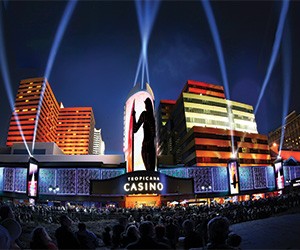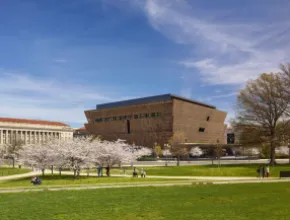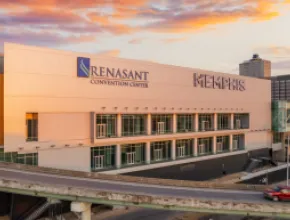When Hurricane Sandy struck here two years ago, some mainstream media outlets hyped up reports of damage and setback, forcing Atlantic City’s meetings and tourism officials into overdrive mode to set the record straight.
This year saw another storm hit—the shuttering of the $2.4 billion Revel and three other casinos, eliminating 8,000 jobs and nearly one-fifth of the city’s tax base. With the Taj Mahal facing closure early this month as of press time, that would leave just seven casinos out of the 12 that began the year, four on the Boardwalk and three in the marina area.
There’s no need to exaggerate the bad news this time around. According to the Philadelphia Inquirer, if the 2,012-room Taj Mahal shuts down, that would mean 5,500 lost rooms in 2014. That’s almost one-third of the city’s 18,500-room inventory, and half of the rooms on the Boardwalk—where research shows most of Atlantic City’s 12 million annual overnight guests stay (total visitorship is 27 million).
Tough times—but the Boardwalk Empire remains unbowed, as this time-tested seaside resort, already on the right path to a new future before this year, is meeting the challenges head on.
Fazed Out
Cycles of boom and bust are nothing new in America’s Playground, which came into being as a tourism destination half a century (1854) before Las Vegas was born on then-dusty Fremont Street in 1905. Over time, these fabled cities would dominate the U.S. gambling market, each riding the ups and downs of changing eras, economic conditions and consumer preferences while sticking to their core gaming revenue models. Similarly, each saw the need to change and adapt that model as competitive pressure rose through the last decade.
From introducing luxurious non-gaming hotels, high-end restaurants, spas and other amenities to draw the upscale leisure segment to cultivating a broader set of entertainment and nightclub options geared to the younger set, neither city has been idle in diversifying its appeal since. Yet, a comparison of official statistics from the New Jersey Casino Control Commission and the University of Nevada Las Vegas reveals that Atlantic City’s casinos did not diversify at the same pace as their Vegas counterparts.
According to a September 2014 Market Watch report on Atlantic City’s future, its Mid-Atlantic neighbors added nearly 34,000 new slot machines between 2006 and 2014, with Pennsylvania knocking Atlantic City out of second place behind Las Vegas for total gaming revenue in 2012. The city’s casinos put up a good fight, lifting non-gaming revenue to 29 percent that year (up from 18 percent in 2000), but for the four casinos that closed this year—Atlantic Club, Showboat, Revel and Trump Plaza—it was too little, too late.
While the shuttered casinos and lost jobs cast unavoidably long shadows on the Boardwalk, there are brighter faces on the flip side of the economic coin.
Phasing In
Back in October, Gary Loveman, CEO and president of Caesars Entertainment, joined New Jersey state dignitaries in celebrating the signing and installation of the final steel beam of the new $125.8 million Harrah’s Atlantic City Waterfront Conference Center.
Slated to open in August 2015, the new venue, located adjacent to Harrah’s Atlantic City, is principally aimed at attracting business from Fortune 500 companies and other corporations. As the city continues to expand its customer base with festivals, headline entertainment, nightlife and other options for the younger set (see “Generation Fun” sidebar, this page), the center is also in tune with—if not ahead of—the times.
“Millennial meetings customers come with a defined set of expectations, including constant connectivity and entertaining programs,” says Michael Massari, Caesars Entertainment’s senior vice president of national meetings and events. “In today’s market, however, I believe that holds true for attendees across all generations. Who in business today doesn’t have a smartphone or one or more social media accounts? I believe that the older generations in the meetings industry have more in common with Millennials than differences, in terms of seeking that cutting-edge meetings experience, which defines our latest project at Harrah’s Atlantic City.”
Providing for what Massari calls “a great execution of meetings all in one place,” the new facility will offer dining, shopping, nightlife, an indoor year-round pool and more under one roof, plus a dedicated network, Wi-Fi, simulcasting and much more.
“Anything you want to do, we can accommodate it in Atlantic City,” Massari says.
It’s a show of faith found in other new investments in the Boardwalk Empire and positive trends on both the convention and product diversification fronts.
Tony Rodio, President and CEO of Tropicana Entertainment, issued a personal statement affirming his commitment to new and returning customers.
“In fact, Tropicana is already doing what we have said Atlantic City must do to move forward,” Rodio stated, referring to ongoing investment in more diverse attractions and non-gaming amenities.
PageBreak
After introducing six new dining concepts last year and the $2 million makeover of its Royal Swan Ballroom, the Tropicana Casino and Resort is now undergoing a four-phase, $35 million renovation that will add luxurious new touches and even more amenities to enhance the appeal of one of Atlantic City’s most visited properties.
Meetings and conferences are never dull at the Borgata Hotel, Casino & Spa, the luxurious 2,000-room gold tower that launched the diversification era back in 2003 (followed in 2008 by its non-gaming sibling, The Water Club). Just last month, comedian Jerry Seinfeld kicked off a series of performances through 2016 at the 2,500-seat Borgata Event Center.
At the 942-room Resorts Casino Hotel, the theme is straightforward: business meets pleasure. For the latter, the property offers more than 60,000 square feet of flexible space, including 14 meeting and function rooms, seven of which offer ocean views. For the former, there’s the new Jimmy Buffett’s Margaritaville Entertainment Complex, which features Atlantic City’s only year-round beachside restaurant, the LandShark Bar & Grill, plus nightclubs, dining and other action at this renowned adult playground.
Announced in June 2014, Meet AC is a new private nonprofit sales organization solely focused on growing the convention, meeting and group market for Atlantic City. While summer is typically slow, the Meet AC sales team booked 49 meetings and conventions in the Atlantic City Convention Center and hotel properties citywide throughout the third quarter.
With 30 meetings and conventions in September alone, the third quarter total of 49 represented a 32.4 percent increase over bookings for the same quarter in 2013, with room nights, delegates and delegate spending all up over the same time period. Growth was also robust at Boardwalk Hall, with 32 shows and sporting events drawing 323,268 people, up 18.5 percent and 33.6 percent, respectively, from September 2013.
Promising, too, is the road ahead.
“Business booked in 2014 for future dates is currently up 52 percent,” says Gary Musich, vice president of convention sales for Meet AC.
“With the Meet AC group sales organization now fully operational, we’re anticipating continued growth in the conventions and meetings market,” stated John Palmieri, executive director of the Casino Reinvestment Development Authority (CRDA), in a recent release.
The CRDA, which funds Meet AC, operates and markets the Atlantic City Convention Center and Boardwalk Hall, and works alongside the casino-funded Atlantic City Alliance, which markets and brands the city, and the state of New Jersey.
Focused on a non-gaming economic plan that includes attracting visitors, building the visitor experience, boosting meetings and conventions, and investing in neighborhoods and job training, this public-private partnership is pumping $1 billion into the city’s tourism district over five years.
Can product diversification work? In August, Atlantic City’s year-on-year gaming revenue was down 1.2 percent, while revenue at the Borgata, with its nightclubs, event center, fine dining and more in mix, was up 5.2 percent. Above all, there is the city’s leadership.
“It wasn’t so many blighted structures so much as vacant parcels,” Palmieri told Market Watch of his view of the opportunity at hand. “There are so many sites available for development.”
With more than 10 acres open for building—and that kind of glass-half-full optimism—Atlantic City is a strong bet for turnaround.







